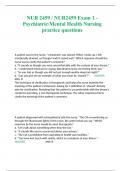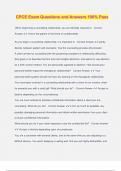Tentamen (uitwerkingen)
NUR 2459 / NUR2459 Exam 1 - Psychiatric/Mental Health Nursing practice questions
- Vak
- Instelling
NUR 2459 / NUR2459 Exam 1 - Psychiatric/Mental Health Nursing practice questions A patient says to the nurse, "I dreamed I was stoned. When I woke up, I felt emotionally drained, as though I hadn't rested well." Which response should the nurse use to clarify the patient's comment? a. "I...
[Meer zien]




